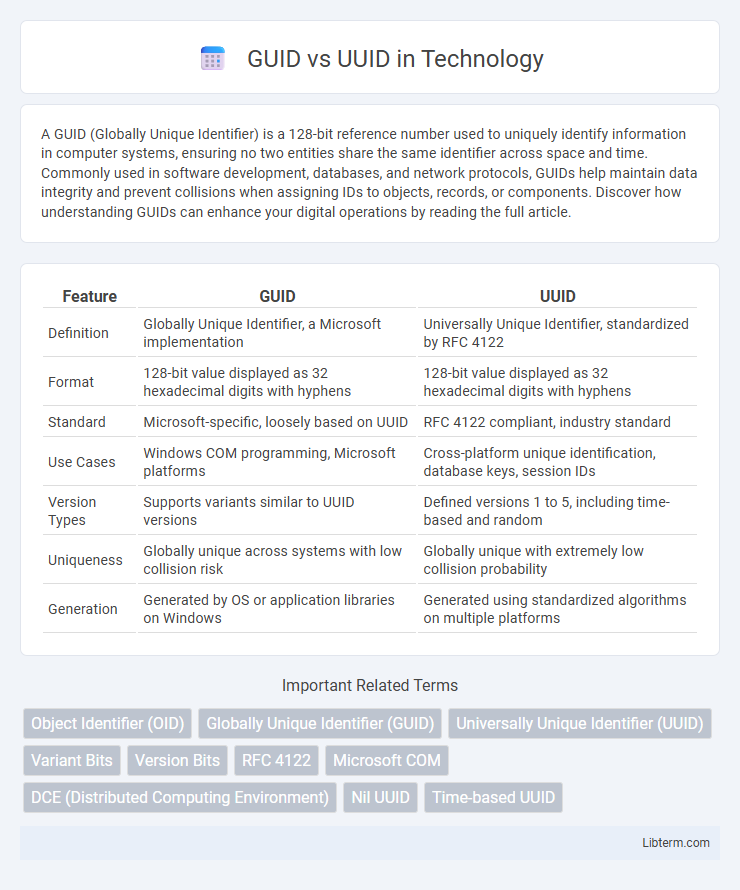A GUID (Globally Unique Identifier) is a 128-bit reference number used to uniquely identify information in computer systems, ensuring no two entities share the same identifier across space and time. Commonly used in software development, databases, and network protocols, GUIDs help maintain data integrity and prevent collisions when assigning IDs to objects, records, or components. Discover how understanding GUIDs can enhance your digital operations by reading the full article.
Table of Comparison
| Feature | GUID | UUID |
|---|---|---|
| Definition | Globally Unique Identifier, a Microsoft implementation | Universally Unique Identifier, standardized by RFC 4122 |
| Format | 128-bit value displayed as 32 hexadecimal digits with hyphens | 128-bit value displayed as 32 hexadecimal digits with hyphens |
| Standard | Microsoft-specific, loosely based on UUID | RFC 4122 compliant, industry standard |
| Use Cases | Windows COM programming, Microsoft platforms | Cross-platform unique identification, database keys, session IDs |
| Version Types | Supports variants similar to UUID versions | Defined versions 1 to 5, including time-based and random |
| Uniqueness | Globally unique across systems with low collision risk | Globally unique with extremely low collision probability |
| Generation | Generated by OS or application libraries on Windows | Generated using standardized algorithms on multiple platforms |
Introduction to GUID and UUID
GUID (Globally Unique Identifier) and UUID (Universally Unique Identifier) are 128-bit values used to uniquely identify information in computer systems. Both GUID and UUID ensure a high probability of uniqueness across space and time, making them essential in distributed databases, software development, and network protocols. GUID is a Microsoft implementation of the UUID standard defined by the RFC 4122 specification.
Definition of GUID
A GUID (Globally Unique Identifier) is a 128-bit identifier used in software applications to uniquely identify objects, resources, or entities across systems without significant risk of duplication. It is a specific implementation of a UUID (Universally Unique Identifier) standardized by Microsoft, primarily used in Windows environments and COM programming. GUIDs ensure global uniqueness by combining time, hardware, and random elements to generate identifiers.
Definition of UUID
A UUID (Universally Unique Identifier) is a 128-bit number used to uniquely identify information in computer systems, standardized by the IETF as RFC 4122. It is designed to be unique across both time and space, providing a high probability that the same identifier will not be generated independently. GUID (Globally Unique Identifier) is a Microsoft implementation of the UUID standard, with the terms often used interchangeably due to their similarity in format and purpose.
Key Differences Between GUID and UUID
GUID (Globally Unique Identifier) and UUID (Universally Unique Identifier) are both 128-bit identifiers used to uniquely distinguish information in software applications. The key difference lies in their origin and usage: GUID is a Microsoft-specific implementation of the UUID standard defined by RFC 4122. While all GUIDs are UUIDs, not all UUIDs are GUIDs, with UUIDs having different versions and variants to support various generation algorithms, such as time-based or name-based schemes.
Use Cases for GUID
GUID (Globally Unique Identifier) is commonly used in software development for identifying database entries, COM interfaces, and ActiveX components due to its unique 128-bit value. GUIDs are essential in distributed systems to ensure object uniqueness across multiple machines and networks, preventing conflicts without a central authority. They are also widely used in Microsoft technologies and Windows environments, making them the preferred choice for applications requiring interoperability and consistency.
Use Cases for UUID
UUIDs (Universally Unique Identifiers) are primarily used in distributed systems to uniquely identify information without significant central coordination, making them ideal for database keys, session IDs, and component identifiers in cloud computing. Their standardized 128-bit format ensures system-wide uniqueness across different machines and time, crucial for merging data from multiple sources and managing replicated information. UUIDs excel in scenarios where uniqueness must be guaranteed without relying on a centralized authority or coordination.
Versions and Formats of GUID/UUID
GUIDs and UUIDs both serve as unique identifiers but differ primarily in versions and formats; UUIDs follow the RFC 4122 standard and include versions 1 to 5, each specifying methods like time-based, DCE security, name-based (MD5), random, and name-based (SHA-1) generation. GUIDs, commonly used in Microsoft environments, are essentially a variant of UUIDs formatted as 128-bit values represented in five groups separated by hyphens, totaling 36 characters including braces. Version 4 UUIDs, which are randomly generated, are the most widely used due to their simplicity and low collision probability, while Version 1 incorporates timestamp and MAC address for uniqueness.
How GUIDs and UUIDs Are Generated
GUIDs are generated using algorithms defined by Microsoft, often combining the MAC address, timestamp, and random or pseudo-random numbers to ensure uniqueness across systems. UUIDs follow the RFC 4122 standard, with versions including time-based, name-based (using hashing), random, and hash-based generation methods to guarantee global uniqueness. Both GUIDs and UUIDs leverage a mix of hardware identifiers, timestamps, and randomization techniques to produce a 128-bit identifier that minimizes the risk of duplication.
Advantages and Limitations
GUID (Globally Unique Identifier) and UUID (Universally Unique Identifier) both provide unique 128-bit identifiers primarily used in software development to ensure distinctness across systems. GUIDs, often generated by Microsoft systems, offer ease of integration within Windows environments and maintain high uniqueness, while UUIDs, standardized by the ITU and ISO, provide broader platform compatibility and a standardized format for distributed systems. Limitations include potential performance overhead in generating and managing these long identifiers, and the rare possibility of collisions despite their vast address space, impacting use cases requiring absolute uniqueness guarantees.
Choosing Between GUID and UUID
Choosing between GUID and UUID depends on the specific application requirements and platform compatibility. GUID (Globally Unique Identifier) is a Microsoft implementation of the UUID (Universally Unique Identifier) standard, where both are 128-bit values used for unique identification across systems. Selecting UUID is ideal for cross-platform consistency and adherence to RFC 4122 standards, while GUID is preferred for Windows-centric environments due to native API support and integration.
GUID Infographic

 libterm.com
libterm.com